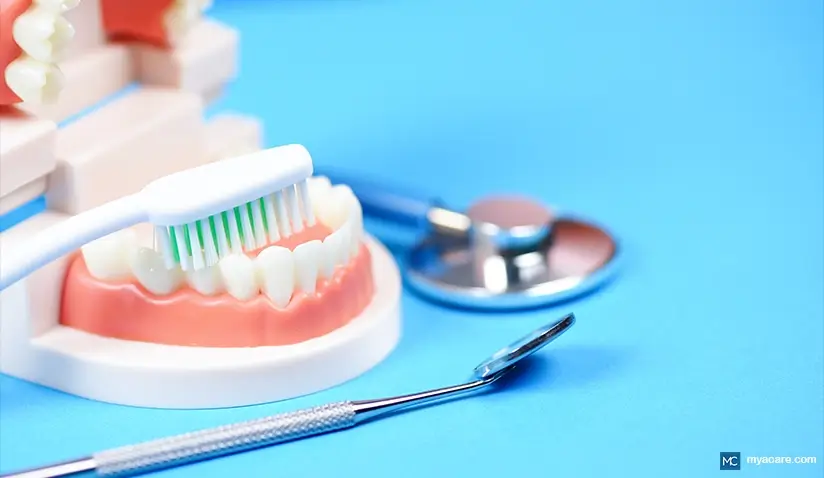How Your Oral Health Can Threaten Other Systems in the Body

The oral cavity is considered to be the window to overall health. It is the most-accessible entry point for pathogens and hosts ~700 types of pathogens. These eventually enter the bloodstream and affect different systems in the body. So, apart from oral health-related consequences such as tooth loss and reduced chewing efficiency, impaired oral health also impacts the systemic health of an individual.
The presence of oral conditions such as periodontal disease and dental caries (decay) have serious implications on the systemic health of an individual. As bacteria multiply, they produce a complex protective layer known as biofilm (plaque). The presence of biofilm on gums may cause gingivitis (inflammation of gums) and periodontitis (inflammation of tissues supporting teeth) which leads to bone loss and eventual loosening of teeth. Bacteria also ferment the food present on the tooth surface, producing acids that demineralize the tooth structure and result in caries.
Research suggests that these oral diseases can affect systemic conditions such as cardiovascular disease, stroke, diabetes, pulmonary disease, osteoporosis, and chronic kidney disease and may produce adverse pregnancy outcomes. So, it is important to understand the relationship between oral diseases and systemic conditions and create awareness about adequate preventive measures.
Below are the systemic diseases related to oral health:
Cardiovascular and cerebrovascular diseases
- People with gum disease are two to three times more likely to be at risk of having heart attack, stroke, and other cardiovascular diseases. Cardiovascular (coronary heart disease) and cerebrovascular diseases (stroke) are primarily caused by Atherosclerosis (narrowing of blood vessels due to accumulation of cholesterol and its products).
- Research suggests that oral health is poorer in individuals with cardiovascular or cerebrovascular diseases when compared to healthy individuals.
- Proposed mechanism linking periodontal disease with cardio and cerebrovascular diseases:
- The presence of periodontal infection allows the entry of bacteria from the diseased gums into the blood. These bacteria eventually invade the heart and blood vessels causing harmful effects.
- The body reacts to periodontal infection by producing inflammatory mediators (e.g., Interleukins 1,6 and Tumor Necrosis Factor). These mediators travel through the blood and enter the heart and blood vessels, causing harmful effects.
- The release of harmful bacterial products (e.g., endotoxins) into the blood has damaging effects on the heart and blood vessels.
- Researchers have reported that improvement in oral health lessens the risk of cardiovascular diseases.
Pulmonary diseases
- The presence of pulmonary diseases such as pneumonia (infection of air sacs of lungs), chronic obstructive pulmonary diseases (COPD: Chronic lung disease obstructing airflow), and bronchitis (inflammation of tube carrying air to lungs) involves aspiration (breathing in) of bacteria from the throat into the respiratory tract causing respiratory infection.
- Proposed mechanisms linking oral diseases with pulmonary disease:
- In individuals with periodontal disease and decay, the oral cavity serves as the reservoir of harmful bacteria. These pathogens contaminate the saliva and enter the lungs, causing infection in systemically weak patients.
- The presence of periodontal disease releases inflammatory mediators in the saliva. These mediators, when aspirated, may change the structure of the respiratory lining (inner skin), promoting the multiplication of pathogens in the lungs resulting in lung infections.
- Research suggests that improving oral hygiene in critically ill patients decreases the risk of developing pneumonia.
Diabetes
- Diabetes, a metabolic disorder with increased blood sugar levels, results from either lack of insulin production or insulin resistance (cells in the body fail to respond to insulin).
- Diabetes (both type 1 and 2) is also associated with periodontitis, which is considered a key complication of the disease.
- Research suggests that the risk of periodontitis is three times higher in diabetics than non-diabetics. Also, individuals with type 2 diabetes and periodontal disease have poor glycemic control.
- Proposed mechanism linking periodontal disease and diabetes:
- Increased blood sugar levels in the body for a prolonged time results in the release of inflammatory mediators in the body. These mediators may cause local inflammation in the mouth, which worsens the periodontal disease. This inflammation also causes complications in systemic health.
- Individuals undergoing a combination of periodontal and antibiotic therapy have reported a positive impact on glycemic control and periodontal disease.
Adverse pregnancy outcomes
- Some research has shown that oral conditions (especially periodontal disease) can negatively impact the pregnancy and may increase the incidence of low birth weight, preeclampsia (high blood pressure during pregnancy), stillbirths, malformations, and spontaneous abortions
- Gums enlarge in size and turn inflammatory during pregnancy due to the change in the levels of estrogen and progesterone hormones in the body.
- Proposed mechanism linking oral conditions and pregnancy outcomes:
- Increase in the size of the gums due to hormones causes change in the microflora (pathogens). There is an increase in the levels of harmful bacteria in the oral cavity or gums that release inflammatory mediators. These mediators enter the womb through the amniotic fluid, resulting in premature contractions and pre-term birth of infants.
- Research suggests that the presence of periodontal disease in the mother increases the risk of pre-term birth by 7.5 times.
Osteoporosis:
- There is a positive association between periodontal disease and osteoporosis in postmenopausal women.
- Some evidence has shown that osteoporosis can impact the jawbone which could cause problems such as tooth loss or mobility. Regular dental visits can correct these problems.
Chronic kidney disease:
- Periodontal disease that results in poor oral health is more common in individuals with chronic kidney disease.
While there is growing evidence of a relationship between oral diseases and systemic conditions, a direct link between them is yet to be established.
Preventive measures
Here are some preventive measures to reduce the effect of oral diseases on systemic conditions:
- Modify lifestyle behaviors by reducing smoking, eating a healthy diet, and exercising to reduce the risk of developing the disease.
- Maintain a good oral hygiene (e.g., brushing twice daily, use of mouthwash, use of interdental aids).
- Visit a dentist for regular checkups and screening of gums followed by cleaning of teeth by a professional.
To search for the best healthcare providers offering dentistry, please use our search engine. We currently have providers in India, Malaysia, Singapore, Spain, Thailand, Turkey, the UAE, the UK and the United States
To search for the best healthcare providers worldwide, please use the Mya Care search engine.

Dr. Shilpy Bhandari is an experienced dental surgeon, with specialization in periodontics and implantology. She received her graduate and postgraduate education from Rajiv Gandhi University of Health Sciences in India. Besides her private practice, she enjoys writing on medical topics. She is also interested in evidence-based academic writing and has published several articles in international journals.
Sources:
Featured Blogs



